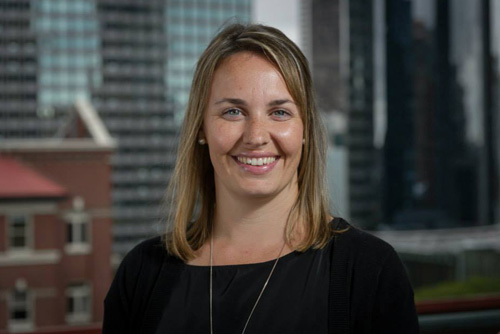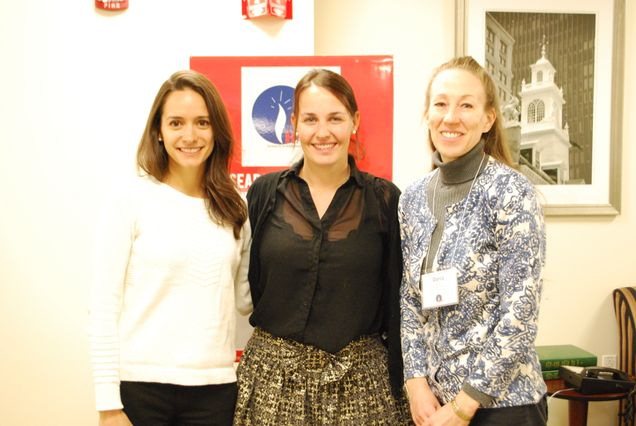RAMS Alumni Spotlight: Dr. Seonaid Nolan
 For our February 2023 RAMS Alumni Spotlight, we interviewed Dr. Seonaid Nolan, MD, FRCPC, DRCPC, from the 2nd RAMS Cohort (2013-2015) about her background and her research since completing the RAMS Program.
For our February 2023 RAMS Alumni Spotlight, we interviewed Dr. Seonaid Nolan, MD, FRCPC, DRCPC, from the 2nd RAMS Cohort (2013-2015) about her background and her research since completing the RAMS Program.
Dr. Nolan is an Assistant Professor with the Department of Medicine at the University of British Columbia as well as a Clinician Scientist with the British Columbia Centre on Substance Use. She provides clinical care for individuals with a substance use disorder at St. Paul’s Hospital in Vancouver and is an established researcher who has worked as a Principal Investigator and Co-Investigator on several observational research studies and clinical trials.
Read on to learn more about Seonaid!
Tell us about your clinical and research background. What led you to study substance use?
As far as my clinical background, I was initially attracted to a career in medicine because of the quintessential cliché of just really wanting to help people. When I went through my medical school training, I thought that I would end being a primary care physician and providing general medical care, but when it came time to choose my residency, I realized that I enjoy hospital, team-based medicine so I pivoted a little bit and ended up completing an internal medicine residency in Vancouver. Through that residency I did a lot of my electives and core rotations at one of our urban, downtown hospitals, St. Paul’s Hospital. What I experienced during residency was that I felt, as internists, we were doing a really great job of treating people’s medical complications related to substance use, but there seemed to be an overarching omission in treating the reason they were presenting to the hospital in the first place, which was their underlying addiction or substance use disorder.
Then I had some fortuitous timing because when it came time to choose a fellowship, my mentor, Dr. Evan Wood, had created a new clinical addiction medicine fellowship and reached out to me and asked if I would be interested, which I absolutely was, so I incorporated a one year clinical addiction medicine fellowship into my two-year GIM fellowship. At the end of five years I had dual certification in internal medicine as well as addiction medicine. It was really Evan Wood who kind of opened the doors of research for me. He was a clinician scientist, a very productive and well-established researcher, and he subtly encouraged me to get involved in low-hanging fruit publications initially. As I started to do more in the research world, I realized that while I had an amazing opportunity to make change on an individual, patient level through my role as being a doctor and meeting one-on-one with patients, if I was ever really going to be well-positioned to enact health system or policy change, it really had to be done through research and the generation and use of data. That was what led me to then pursue a one-year research fellowship through our institution in Vancouver as well. I completed that research fellowship a year after I had finished my clinical fellowship, and in that year my mentor also encouraged me to apply for the RAMS Program because of the amazing opportunity for networking with like-minded clinician-scientists in Canada and the US. I was really fortunate to be accepted and loved the program and just felt like completing that two-year program really opened a lot of doors for me in terms of getting to know different people across the US and Canada.
In what ways did your involvement with the RAMS Program assist you with your research career?
The RAMS Program provided me with a ton of support that I didn’t have at my local institution. I think the beauty of the RAMS Program is that it has such an amazing focus on really helping people navigate the research process, all the way from the inception or generation of a research idea to executing a data collection project, to analyzing the data, to interpreting the data, and then to generating a publication or somehow translating the key results. I really appreciated that opportunity, as well as the opportunity to work with clinician scientists who didn’t work at my local institution and had a different perspective in terms of how a research team operates, what your interface looks like with a data team, and other things like that. So I feel like the RAMS program provided me with an amazing perspective around how to conduct research successfully that I wasn’t able to obtain in my host institution. But it also provided me with a lot of confidence and support in terms of knowing that this career trajectory that I was choosing was the right one for me. The mentorship provided through the program helped a lot with that.

What would you consider an interesting or surprising finding from your research so far?
My main research interest is the intersection of substance use in the hospital setting, and I’m always continuously surprised with the discrepancy between what we know as clinicians and what is out there in the literature. Many of the practices that myself and my colleagues engage in seem standard at our home institution, yet when we review the literature often it may be scant. Accordingly, this offers a unique opportunity for us to utilize our clinical practice patterns and translate related findings through research.
Tell us about some directions you see your research going in.
I am particularly interested in demonstrating the improvement offering comprehensive, coordinated addiction care can have on an individual’s long-term health and social outcomes. More specifically, I am keen to evaluate how seamlessly supporting an individual all the way from one’s presentation to the emergency department, through to detox, inpatient recovery treatment and outpatient longitudinal follow up can impact one’s trajectory when it comes to addiction. At present, we are working on securing funding for this work and hope to be able to implement it over the next few years.
What has been a particularly challenging IRB issue you have had and how did you address it?
I think probably the biggest challenge is the logistics of trying to meet REB (which is the equivalent of the IRB in Canada) requirements, when I feel as though sometimes members of the REB don’t have a comprehensive understanding of the clinical environments, so there’s sometimes a bit of a disconnect around that. Often what we know as clinicians is clinically feasible can be questioned by members of the REB simply because they don’t routinely operate within that environment – which I think is fair, but it does lead to a significant amount of time being devoted to helping provide some education or understanding around that for the REB and then there’s obviously a big disconnect when different members of the REB are reviewing different applications and one research approach may have been easily approved by one REB team, and then you propose the same approach and often you are provided with a lot of feedback, comments, and revisions. So sometimes there’s a bit of inconsistency as well as that disconnect between the REB members and the clinical settings in which we operate.
I had a very long, drawn-out REB process when I was proposing my very first hospital-based cohort study back in 2017. The study itself was looking to enroll individuals who had a SUD and were accessing addiction treatment at our hospital, and we were looking to administer a one-time interviewer-administered questionnaire when people were enrolled and then receive their consent to link to a number of health and administrative databases over a five year follow up period. At that time, the REB wasn’t overly familiar with the idea of developing virtual cohorts, and so I had to navigate a huge number of initial hurdles around the methodology that I was proposing and the follow-up time, etc. I think a lot of it was resolved through me actually physically attending an REB session and presenting the project and having the opportunity to just answer direct questions from REB members in an in-person fashion, rather than this long, drawn-out back-and-forth between the REB and our research team. So I think that was really helpful, and then obviously you have to make some concessions in terms of your approach to satisfy the REB and to make sure the research you’re conducting is done in an ethical way. It’s usually a back-and-forth conversation where sometimes the REB team doesn’t understand and sometimes it’s me that doesn’t understand what the requirements are for the REB, so I’ve just found that either direct in-person meetings or follow up meetings to hash out those situations has been really helpful.
How has the COVID-19 pandemic inspired you to focus on new work?
COVID was just such a derailment for all studies, so now I think even having the opportunity to just get back into general research gives me a perspective that I lacked before. I now realize how lucky we are to be able to conduct in-person research again. Everyone will think about pre-COVID vs. post-COVID and research is no different. I wouldn’t say that the pandemic has particularly inspired me to do more research, because I was always pretty inspired in that domain, but I think it’s provided me with a sense of gratitude for being able to conduct research and answer specific clinical questions that maybe I didn’t appreciate as much before.
Tell us one thing about yourself that readers might find interesting.
I think from my perspective, the key to success is trying to find good balance. For me it’s a daily struggle, but what grounds me and provides me with the ability to be more productive than I would be otherwise is having a really strong sense of family. I have three kids, a husband, and a dog, and we lead very busy lives. Although it sounds counterintuitive, shutting off the email and phone and being really attentive to family time on the weeknights and the weekends has led to me being more productive overall.
Interview conducted by Lydia Carlson, MPH